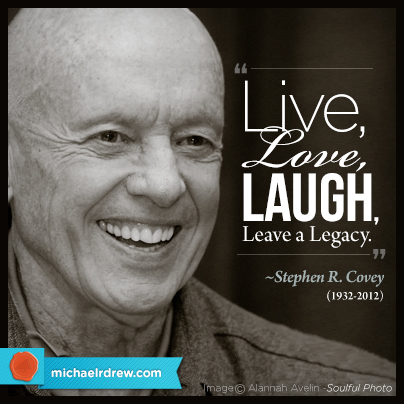 Many of the people you encounter can change your life.
Many of the people you encounter can change your life.
Stephen R. Covey changed mine before I'd actually met him.
My career as a book marketer and entrepreneur began at a division of The Covey Leadership Center, his training and consulting firm.
What I learned about books began with spending time in a wonderful organization that Covey founded and my career of, so far, working with 73 New York Times bestselling authors.
As anyone knows who's ever scanned the business bestsellers lists or browsed the shelves at a bookstore, Stephen R. Covey was the author of The Seven Habits of Highly Effective People, one of the bestselling business books of all time, which has sold something like 25 million copies worldwide.
And it's that rare business book whose tenets, which are based on being an ambitious realist, have not become the stuff of parody.
How rare is that?
If you've read enough business books, you already know that some of them are already parodies of themselves. My friend Bob Hughes, in his novel Late and Soon, mocked a certain trend of highfalutin' business titles by having one of his characters write one called Teresa, CEO, about how today's businessperson could learn from what St. Teresa of Ávila did in building her convents in Spain in the 16th century. It was close enough to the truth to be funny -- remember Jesus, CEO? -- and also close enough to be a little pathetic about the feeble creativity of most business books.
But Stephen R. Covey wasn't like that. He actually was creative because he didn't try to re-imagine the wheel: He realized that people weren't paying attention to what was lying there right before them. He emphasized what so many people in business fail to grasp: common sense and straightforward, honest direction.
If you're one of the rare people who haven't read his Seven Habits of Highly Effective People, here are the steps:
- Be proactive (you must decide to do something, then you actually have to do it)
- Begin with the end in mind (what do you want to be, what do you want to do, really?)
- Put first things first (do what's important rather than what's merely pressing)
- Think "win-win" (it's often better to arrive at a compromise than declare victory)
- Seek first to understand, then to be understood (be empathetic)
- Synergize (think in terms of teamwork)
- Sharpen the saw (in other words, find balance in life and renew yourself).
Sounds like simple advice. But who actually follows it? Covey believed that anyone could be successful if he or she simply did what was necessary. But so few people actually put one foot forward, listen to others, try to compromise, to balance and renew. They just get by and resent where life has taken them.
But when I was at the Covey Institute, I saw these seven steps in action. Covey was able to instill a level of belief in each of these steps that everyone around him tried to incorporate each and every day.
It wasn't until many years after I worked with his organization that I actually met Covey in person.
And whom did I find?
A man who lived by his principles.
He was always kind, for one thing. This is no small thing -- many very successful people have little time for the niceties of human interaction (think Wall Street players). But Covey wasn't like that at all. He listened to what I said. Really listened, as in trying to understand. He treated me as someone who mattered. He treated everyone like that. He treated me the way each of us hopes to be treated, and the way all too few of us actually treat others.
He created a work environment that felt and emulated family. Not a dysfunctional one, of course, but one where you felt at home, because you were doing work that mattered with people you cared about, because you'd discovered what you'd wanted to do and you were there to do it and you enjoyed doing it.
So few of us have articulated our principles that to live by them is something we rarely think of. Instead, we get by. We rarely do, in an active sense, what we want to do.
Covey taught me that to be myself and to do what moved me was to live life as it should be lived. And he showed me that to truly appreciate what we have it's important to do it with transparency, kindness and generosity.
These elements are there in his seven steps. Covey was a visionary for a reason that few people grasp: he saw that the world might work better if we actually paid attention to it. And to each other.
For more by Michael Drew, click here.
For more on success and motivation, click here.